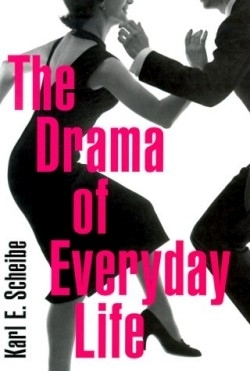It looks like you've stumbled upon a page meant to be read by our code instead of viewed directly. You're probably looking for this page.
The Drama of Everyday Life
Darning the wardrobes of our unwitting psyches with glittering threads of enlightenment, while sparing the pierce of a clinical needle, The Drama of Everyday Life intelligently illuminates the cast of characters who roam the arena of our world, engaged in the theater of life.
The product of an unsettling sense of emptiness in the real and apparent success of traditional psychology as a science and profession, Everyday Life presents the “dramaturgical approach” to psychology, one which identifies the writhing force which struggles to exalt our lives from mundane to magical. Both a psychotherapist in private practice and a professor at Wesleyan University, Scheibe calls for a form of “quotidian psychology,” one which lowers the mask of traditional psychology, to reveal the faces of the players beneath and study the scripts of their commonplace lives in order to comprehend the drama life affords.
Drawing from the Russian dramatist Nicolas Evreinoff, Scheibe maintains that “The essence of drama is transformation.” Extending this impression to the realm of psychology, “transformation” masquerades as the series of restless life cycles and exchanges that skirt the doldrums-the antithesis of drama. The book tirelessly examines the elements of dramaturgy in life with a rapid succession of enticing chapters, which often become agile intellectual jaunts into the recesses of personal thought. Amidst the torrents of insight filling each chapter, Scheibe fingers drama as the indirect spawn of boredom, considers the role of the stock market and gambling as dramatic rather than financial speculation and revisits the behavioral motivation of sex and food as dramatic fodder.
Concerning personal appearance and the range of societal roles it permits (and perhaps commands), Scheibe identifies the distinctive array of clothing and cosmetics people use, for example, as the physical vehicles for dramatic transformation. Carefully balancing both positive and negative functions throughout the book for each example offered, the author affirms the necessity of people “costuming” themselves to achieve “dramatic illusion,” yet considers still the frail grasp on motivations, evident in the shopping malls where Scheibe suspects “the customers are only half-conscious of what they are doing here.”
By infusing the theories of countless figures within the field of psychology, The Drama of Everyday Life exudes an inherent value for students, while its winning literary style offers universal appeal. Immune to the cyclic bowing out of each weary actor, drama endures - swirling in the footlights which never dim, beneath the curtain which shall not fall.
Reviewed by
Karen Wyckoff
Disclosure: This article is not an endorsement, but a review. The publisher of this book provided free copies of the book to have their book reviewed by a professional reviewer. No fee was paid by the publisher for this review. Foreword Reviews only recommends books that we love. Foreword Magazine, Inc. is disclosing this in accordance with the Federal Trade Commission’s 16 CFR, Part 255.
